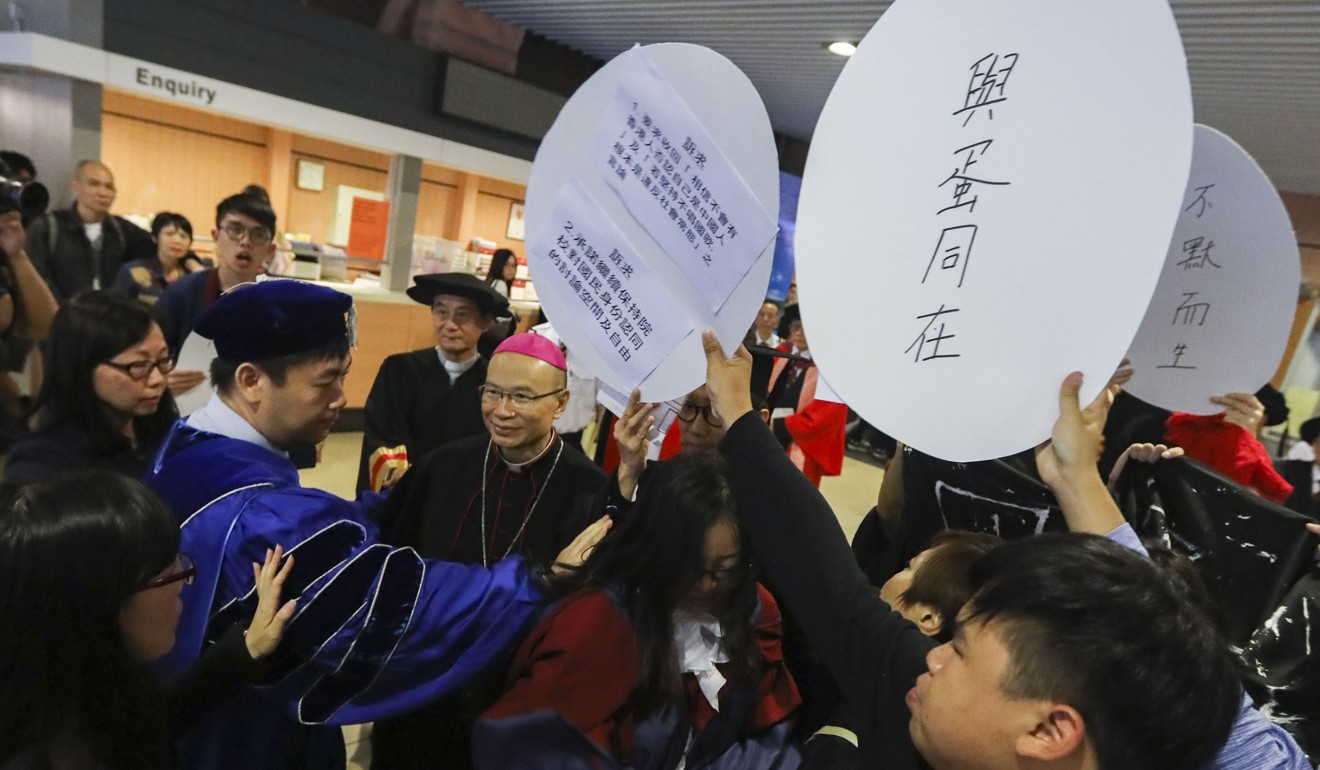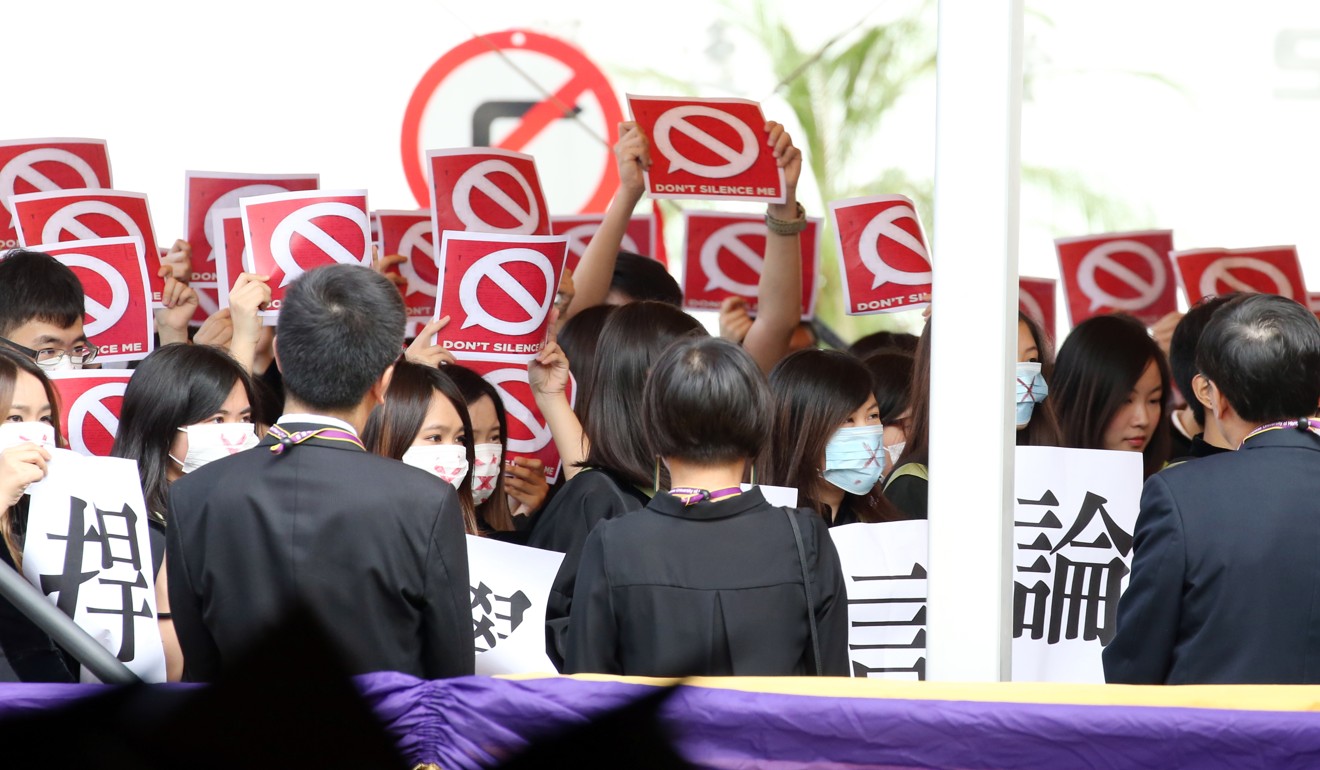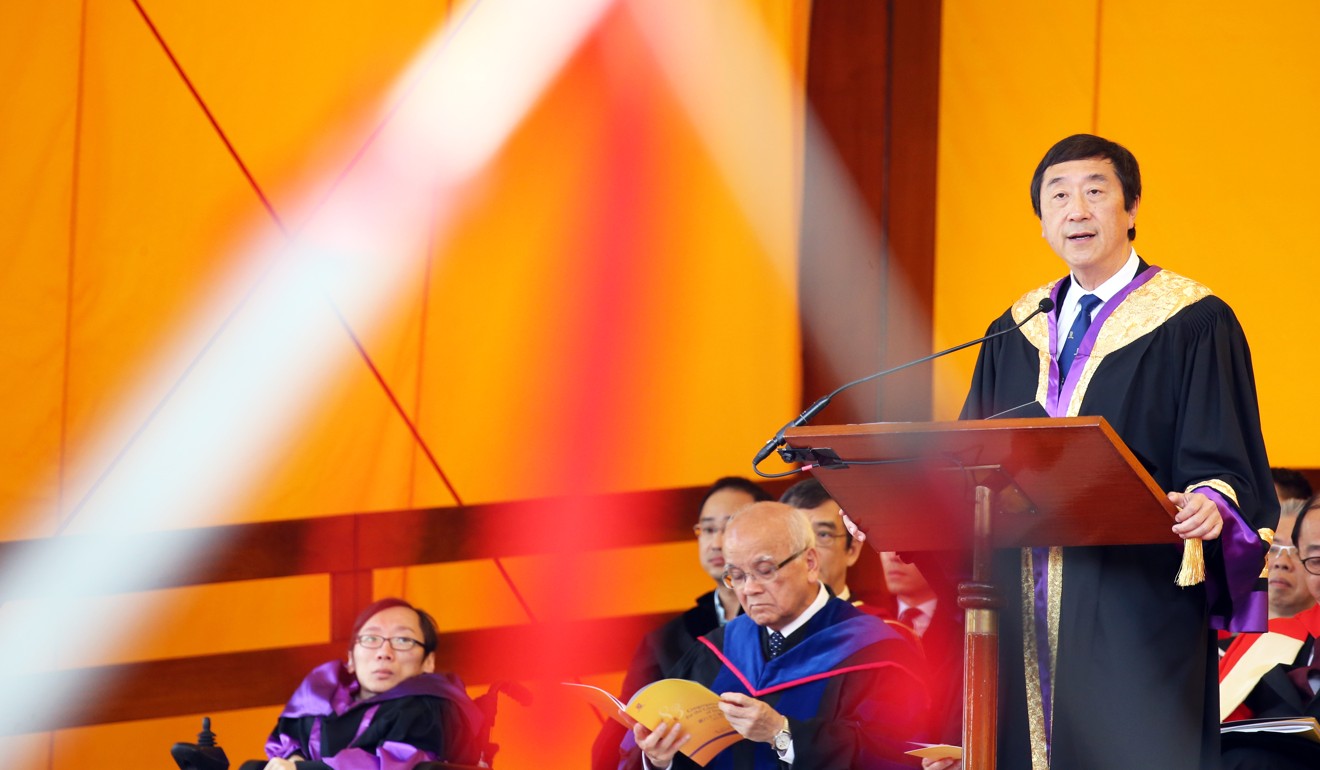
Update | Clashes over national anthem law at Hong Kong graduation ceremony
Students at Caritas Institute of Higher Education try to confront bishop who said not singing anthem ‘violates social norm’
Chaos broke out at a graduation ceremony in Hong Kong on Thursday as students protested against a bishop’s support for a controversial national anthem law.
Bishop Michael Yeung Ming-cheung, the chairman of the board of governors in Caritas Institute of Higher Education, had earlier said singing the anthem was a very natural thing and people who refused to sing along were “violating the social norm”.
A group of about 10 graduates had planned in vain to stage a protest at the ceremony in the Tseung Kwan O institute, with a black banner reading: “Singing the anthem is not a social norm”.
Clashes broke out when Yeung, flanked by security guards and staff, ignored students who were chanting, trying to hand him petitions and blocking his access to a lift.

After a short deadlock, Yeung responded and clarified his remarks: “I did not mean I would force students to sing the national anthem.”
He asked the students to hand their letters to the university management.
“Yeung’s remarks are stifling the students’ chance to discuss our national identities … I would not say I am a Chinese at this moment,” Janet Chan, a social work graduate said, referring to Yeung’s earlier remarks that most people would not reject their Chinese identities.
Chan also opposed the anthem law, saying she did not know how to express respect and “the appropriate emotion” towards the anthem without having heartfelt approval.
Showdown at Chinese University campus over posters and politics
Meanwhile, a group of youngsters staged a silent protest and held up signs calling for the protection of free speech during Chinese University’s graduation ceremony on Thursday, but when the national anthem was played, they did not boo or cause a scene.
Instead, most of them at the degree conferment ceremony got to their feet, with some singing along to March of the Volunteers and taking photos, a surprise given that Chinese University’s campus had been ground zero for pro-independence campaigning by tertiary students just months ago.
In September as the academic year began, banners and posters calling for Hong Kong’s separation from China sprang up across the university.
University staff quickly removed the materials, but they reappeared the following day and spread to five other universities.
Why the campus feud between Hong Kong and mainland Chinese students?
On Thursday, about 50 social science graduates wore face masks and held up banners as they received their degrees.
The signs said “Safeguard freedom of speech in academia” and “Don’t silence me”.
Social work department graduates had initiated the protest, saying they aimed to draw attention to threats to freedom of speech, which is protected under the Basic Law.

One of them told the Post that the university should tolerate all expressions of political views.
“The democracy wall dispute made us feel that freedom of speech was threatened on campus,” the graduate said.
“We just want to grasp the last chance to convey our views,” former student union president and fresh graduate Tommy Cheung Sau-yin said.
Asked why they had decided not to act when the anthem was being played, Cheung stressed he and his peers were more concerned about the democracy wall episode than the looming anthem law.
‘Large-scale’ breach of new anthem rules could see law applied retroactively, top Beijing adviser Elsie Leung says
China’s top legislative body, the National People’s Congress Standing Committee, decided to incorporate the mainland’s national anthem law into Hong Kong’s Basic Law on November 4, which means the city’s government must pass a local law to the same effect.
The law, effective on the mainland from last month, requires everyone to stand solemnly when the anthem is played, with those who flout it facing detention of up to 15 days or jail of up to three years.

Meanwhile, retiring vice-chancellor Professor Joseph Sung Jao-yiu, in his speech at the ceremony told students to listen to all sides before jumping to conclusions.
“There is more than one way to view things,” Sung said, adding that this applied to both political debate and interpersonal relationships.
“Even with harsh words on the tip of your tongue, leave some unspoken.
“Even with the argument won, leave a door open for your opponents,” he said.
Watch: Students remove Hong Kong independence posters at CUHK
Sung used Cantonese, English and Mandarin in his speech on Thursday, after he was heavily criticised for starting his speech in Mandarin last year.
Sung also said it was his great honour to have served the University since 2010.
Professor Rocky Tuan Sung-chi will succeed Sung and head the university for six years from 1 January 2018.

